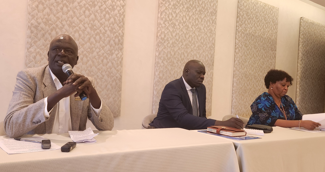Stakeholders, including civil society, parliamentarians, business, youth, women, persons with disabilities, the business community, and faith-based groups, on Thursday called on the government to renew and implement the National Comprehensive Action Plan aimed at protecting children affected by conflict in South Sudan.
Speaking at the conclusion of a two-day workshop organised by Community Empowerment for Progress Organisation (CEPO), Edmund Yakani, CEPO’s Executive Director, said the stakeholders signed a communique committing participants to support the National Technical Committee responsible for implementing the plan.
Yakani said the action plan, which recently expired, outlines the government’s commitments to prevent the recruitment and use of children by armed forces and groups, and to safeguard facilities such as schools and hospitals.
“We are urging His Excellency President Salva Kiir to direct the renewal of the action plan and for relevant ministries to work together,” he said. “Our campaign is for a South Sudan free from children associated with conflict, and to ensure those affected are given safety and protection.”
Yakani emphasised that the new communique will be stakeholder-driven, unlike previous efforts.
“Implementation has been there by mouth, not by action. This time, stakeholders will be in the driving seat to ensure commitments are translated into tangible outcomes,” he stated.
A follow-up meeting is expected next week to develop an implementation roadmap.
For his part, Samuel Buhori Lotti, Deputy Chairperson of the Specialised Committee on National Security and Public Order in the Transitional National Legislature (TNLA), urged stronger collaboration between parliament, civil society, and other stakeholders to ensure effective protection of children affected by conflict.
He commended participants for their dedication but cautioned that the journey toward full implementation of the action plan “will be long and challenging.” He highlighted the crucial role of civil society amid government budgetary constraints and called for accountability in public spending.
“Civil society’s role cannot be underrated at this critical time when the government struggles to meet its responsibilities,” he said, noting that some ministries spend less than one percent of their approved budgets while others overspend excessively.
He stressed that Parliament relies on data from civil society to hold ministries accountable for abuses against children, including unlawful recruitment and detention.
Despite challenges, Lotti urged stakeholders not to lose hope, saying, “We must continue to act, legislate, and advocate — not for ourselves but for the next generation.”
Meanwhile, Oluku Andrew Holt, National Coordinator for Children at the Disarmament, Demobilisation and Reintegration (DDR) Commission, confirmed that the National Comprehensive Action Plan is being renewed for another two years after expiring on 15 October 2025.
“The issue of children cannot wait. Whether the action plan is expired or valid, the protection of our children must continue,” Holt said, adding that a formal request for extension has been drafted and will be submitted to the Ministry of Defence for approval.
He praised the workshop’s inclusivity and proposed creating a child protection desk in the Office of the President to strengthen coordination.
Holt noted that the plan—first signed in 2009 and revised several times—remains a shared national responsibility between the Government of South Sudan, the United Nations, and partners to safeguard children from the impacts of war.
On her part, Patricia Njoroge, Chief Child Protection Officer at the United Nations Mission in South Sudan (UNMISS), commended the joint communique and called for concrete follow-up.
“Let it not be filed away—let’s implement it,” she said, urging all actors to turn commitments into action. Despite global funding cuts, she pledged continued UN support, saying the Mission would use available resources for targeted child protection initiatives and closer engagement with Parliament.
“If we all speak out in our own communities, we can make an impact; the UN alone cannot do it. We need everyone to pull their weight,” she said.
Njoroge reaffirmed the UN’s commitment to supporting the government and partners in implementing the National Comprehensive Action Plan to end the recruitment and use of children and ensure their safety from conflict-related abuses.




